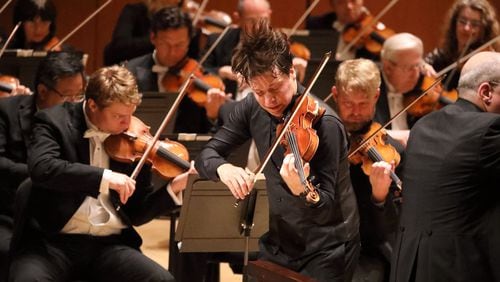NEW ASO SEASON
Atlanta Symphony Orchestra 2016-17 Season Concerts
Sept. 15-June 3. $20-$79. Symphony Hall, 1280 Peachtree St. N.E., Atlanta. 404-733-4900, www.atlantasymphony.org.
It almost seemed like Music Midtown had started early. Not only was there a horrendous traffic snarl in Midtown Atlanta two nights before the music festival at Piedmont Park was set to begin, but there was also great music in the air.
On Sept. 15, the Atlanta Symphony Orchestra opened its 2016-17 season at Symphony Hall with a full Tchaikovsky program under the baton of music director Robert Spano. The program featured star violinist Joshua Bell as soloist on the Concerto in D Major. Traffic aside, it would be hard to imagine a more compelling and exciting opening night.
Strangely enough, Christmas seemed to come early, too, as the concert opened with a performance of Tchaikovsky’s Suite No. 1 from the ballet “Nutcracker.” Removing the music from the Christmas season and from the context of dance did provide listeners with the best opportunity to hear it simply as music.
One was reminded that this is expertly crafted, beautifully textured music. It was especially nice to hear and see how easily Tchaikovsky could move the melody from section to section, as a loopy run would glide from the cellos to the violins and back. Spano brought out a lovely and rare sense of genuine languor, spaciousness and sensuality in the “Danse Arabe,” a sort of 19th-century opioid dream, and the flutes sounded especially fine on “Danse Chinoise” and “Danse des Mirlitons.” The performance was most memorable for its sussing out those textured, compelling moments in earworm classics, but at times the sound could be unfocused, with lower registers too strong. Still, one longed for an orchestra as fine as the ASO to perform the music for a ballet performance of the work at Christmastime.
If there’s a close second for “orchestral music so familiar it’s hard to hear it without thousands upon thousands of various contemporary associations coming to mind,” it would have to go to Tchaikovsky’s “Romeo and Juliet” Overture-Fantasy, which was, as it turned out, second on the program. Despite its familiarity, the ASO approached it with a sense of energy and interest that was exciting. Especially impressive here were the stormy passages that seemed to boom with a sense of real, thunderous violence; paired with those famous romantic strains, they create a drama that’s cheesy, sure, but irresistibly captivating, as well.
If the first half of the evening was a crash course in listening to old music with new ears, one was grateful for the lesson by the time Bell walked on stage to play the Concerto for Violin and Orchestra in D Major for the concert’s second half. Bell can grip a melodic line in the most solid and ineluctable way, but, particularly when the orchestra is silent and the sound carried by the violin alone, he can hold the musical thread loosely, nearly letting it slip away in quiet, deliciously slow, high notes that send the mind in mazelike loops. Bell is not averse to moving on stage, and more importantly, he’s not averse to unabashedly diving into the romanticism of Tchaikovsky’s music; both qualities seemed apt in his vividly depicting the various dramatic landscapes of the concerto.
Bell proved even new music can sound overly familiar with an encore of a selection from contemporary British composer Nigel Hess’ score for the 2004 film “Ladies in Lavender.” Sticky and sweet, but not without appeal, it certainly demonstrated the ways in which Tchaikovsky was a strong, perhaps the strongest, influence on composers of music for film in the century that followed his life.
Still, the ASO and Bell delivered a strong opening night with what’s sure to be an enticing season to follow, especially with, as soon as next week (Sept. 22-24), an appearance by the fantastic pianist Garrick Ohlsson on Rachmaninoff’s Piano Concerto No. 3 in D Minor.






